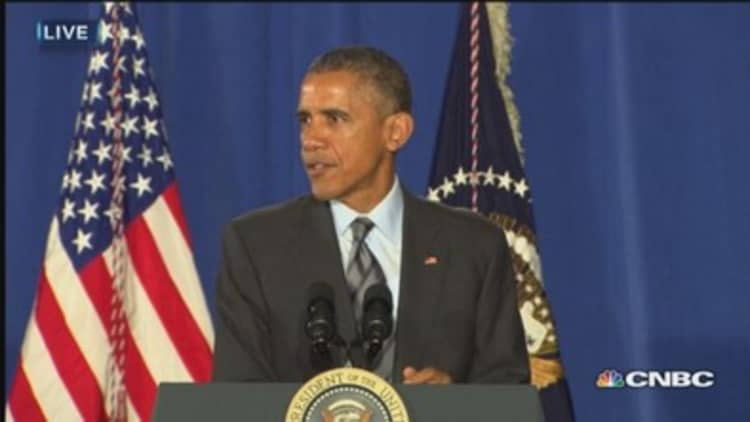In their initial budget proposals, House and Senate Republicans have displayed some notable intraparty divisions—over financing defense spending and overhauling entitlement programs, among others.
But those shadings pale next to the stark, black-and-white contrast with the priorities in President Barack Obama's spending plan. And that contrast will frame debate in the evolving 2016 race to elect Obama's successor.
Obama has couched his approach as "middle-class economics" aimed at reversing the long-term stagnation in incomes for average families. It proposes that Washington spend more on education, infrastructure and job training. He argues that spending will fuel economic growth.
It provides new tax breaks for those with modest incomes—and raises taxes on Wall Street and high-income Americans to pay for them. It proposes to hold the budget deficit, which has declined lately, at a stable level relative to the size of the economy. But it does not eliminate the deficit.
Read More I need to declare what on my taxes?!? Obamacare confusion
Republicans propose to cut precisely the kinds of domestic spending Obama wants more of. They argue that higher spending levels and taxes would retard future growth.
They would repeal "Obamacare" outlays for health insurance subsidies and sharply cut spending on the Medicaid program that provides health insurance for the poor. They would eliminate the deficit over 10 years, though they use some budgetary sleight of hand to do it—assuming the government would find some other sources for the Obamacare tax revenues they'd repeal, and that their unspecified tax reforms would ramp up growth.
The competing approaches reflect the electoral coalitions and well as the underlying philosophies of each party. Democrats rely heavily on younger, low-income and nonwhite voters who disproportionately benefit from their tax and spending plans.

Republicans rely heavily on older white voters. It's no accident that the Republican budgets propose no change in Social Security benefits. And while the House Republican budget would convert Medicare into a voucher-like program through an approach called "premium support," it wouldn't implement any changes for 10 years.
Read MoreDonald Trump forms presidential exploratory committee
The most important political question is whether the eventual Republican presidential candidate sticks with the congressional Republican approach. Republicans need to expand their appeal nationally to win presidential elections, and contenders such as Jeb Bush have emphasized the need to lift middle-class incomes, too. They haven't defined how.
One hint of how the nominee will handle the issue comes from the approach that George W. Bush used in 2000. Then, another Republican Congress was proposing cuts in domestic spending. Bush, then Texas governor, said he opposed balancing the budget "on the backs of the poor."


